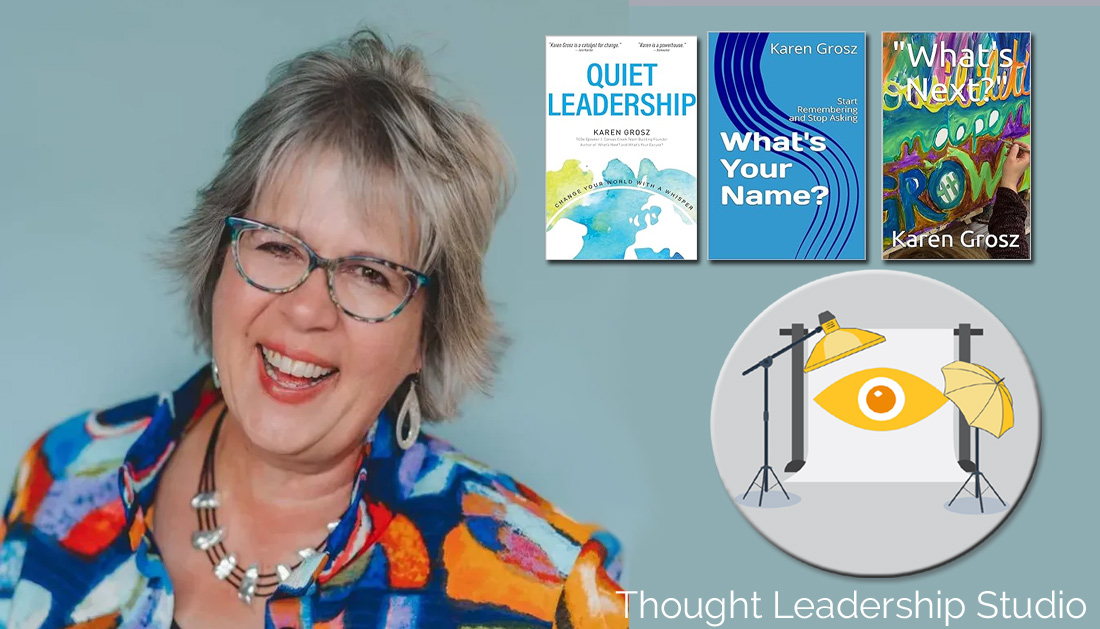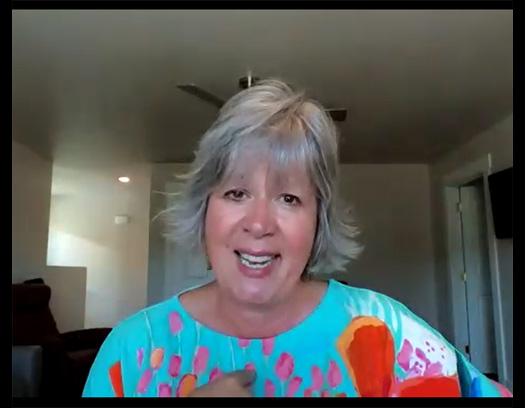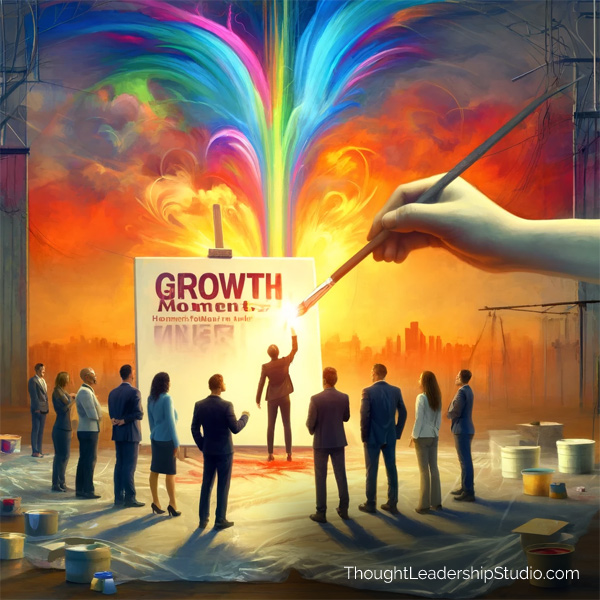Thought Leadership Studio Podcast Episodes:
Unlocking Creative Team Dynamics through Art with Karen D Grosz
Episode 75 - Transforming Corporate Culture: Harnessing Creativity and Silent Collaboration to Foster Innovation and Change with the Founder of Canvas Creek Team Building

#collaboration, #creativity, #innovation, #inspiration, #interviews, #leadership, #motivation, #teamdynamics, #thoughtleadership
Or Click here to listen or subscribe on appWhat this episode will do for you
:- Understanding Team Dynamics through Art: Discover how Karen D Grosz integrates artistic approaches to enhance team collaboration and communication.
- Insights into Creative Leadership: Learn about Karen's innovative leadership techniques that leverage creativity to inspire and motivate teams.
- Art as a Tool for Problem-Solving: Explore how artistic methods can be applied to solve complex problems within teams and organizations.
- Building a Culture of Trust: Gain insights on how to foster a trusting and open environment in the workplace using creative strategies.
- Enhancing Team Performance with Creativity: Understand the impact of creativity on team performance and how to implement it effectively in your organization.
- Empowering Teams with Artistic Techniques: Learn practical artistic techniques that can be used to empower and engage team members, leading to higher productivity and satisfaction.
Karen D. Grosz.
In this episode, I'm excited to introduce Karen D. Grosz.
Karen Grosz, known as the "Monday Videos Lady," is a change agent and catalyst for change. She helps people embrace change and drive it themselves. She believes that change is important for success and that society needs to be more open and authentic.
Karen's work involves team building through collaborative art projects, where teams create art together in silence. This process allows teams to observe how they interact and collaborate, and helps them make decisions and solve problems.
Karen also emphasizes the importance of creativity and suggests that people try new things and spend time in quiet reflection to enhance their creativity. She can be reached through her website, Canvas Creek Teams, and offers a book called "Quiet Leadership" that explores the lessons she has learned about leadership.
Some of Karen's coordinates:
Curated Transcript of Interview with Karen D. Grosz
The following partial transcript is lightly edited for clarity - the full interview is on audio. Click here to listen.
Chris McNeil: So I'm your host of Thought Leadership Studio, Chris McNeil, and I'm sitting here across Zoom with Karen D. Grosz, who is known as the "Monday Videos Lady" for her Energetic. Welcome to the week. Karen is a five-time author, both an award-winning, and Ted x speaker founder of Canvas Creek team building and recipient of the Montana Governor's Award for volunteerism. Her mission is to inspire others to be their best, to try the next thing and to know they are worthy every effort it takes to live there next. Welcome, Karen.
 Karen D. Grosz: Oh my gosh. I'm excited to talk to you, Chris. Thank you.
Karen D. Grosz: Oh my gosh. I'm excited to talk to you, Chris. Thank you.
The Power of Being the Change Instigator
Chris McNeil: So I also see that you're described as a dynamo and catalyst for change. So you're a change agent.
Karen D. Grosz: Oh my gosh, I love to help people do new things, sit in a new seat, try new toothpaste, change their business model. Yes, I'm all about change.
Chris McNeil: o have you always been like that or did you become that way?
Karen D. Grosz: That is a great question. So many years ago, I was in the car business, which is where I learned so much about the world, and a trainer came in and asked us about change, and I said, oh, I'm great at change. And the whole team, which was all men, I was the only woman, all of them said, "You are not."
And I was so shocked, and that's when I realized that I was good with change if I was the one instigating it. And I find that's true with almost everybody. We like change as long as we get to be in charge of it. So I do love change. I really have leaned into that and I help teams lean into change, but I do like to drive it. I don't like to have other people drive it.
Chris McNeil: So is that a wake up call, a pivotal moment for you that sets you off on this path?
 Karen D. Grosz: Yeah, that absolutely was a pivotal moment of discovering more about myself and finding out ... Before that, I didn't really understand this whole world of training and motivation that was out there, so it really wasn't this good introduction to that. And I decided I wanted to be a happier person and I wanted to embrace change.
Karen D. Grosz: Yeah, that absolutely was a pivotal moment of discovering more about myself and finding out ... Before that, I didn't really understand this whole world of training and motivation that was out there, so it really wasn't this good introduction to that. And I decided I wanted to be a happier person and I wanted to embrace change.
Chris McNeil: And what has that done for you?
Karen D. Grosz: Well watch the Monday videos.
Chris McNeil: I will. And I'll link to that for the listener as well. That'll be on the episode page (linked to in the episode description).
Karen D. Grosz: Oh, that's great. Thank you. Yeah, so I decided, we lived in Alaska and I went through the very depressed we've been in Alaska too long and it's dark outside and went through all of that and decided I didn't want to be that.
And I've had some things happen in my life that I could have gone down a victim path, but instead I chose to be happy. And so every day I wake up, my feet hit the floor, we head out the door, it is all about happiness. And my Monday videos are, they start with Happy Monday and there's some jumping ...
Chris McNeil: Uh huh, nice ...
Karen D. Grosz: Just trying to get people to embrace that idea that you get to choose how you show up in the world. And now I can't show up without a smile and without energy and I, oh my gosh, I do so much for a person my age. I get to do a lot. That's what I decided to do.
Silent Collaboration: Revealing True Team Dynamics
Chris McNeil: That's awesome. I heard Wayne Dyers, it really impacted me. I heard him say a long time ago that happiness is not about getting it from life. It's what you bring and give to life.
Karen D. Grosz: Oh my gosh ...
Chris McNeil: That impacted me. That impacted me deeply. I thought about that. It's a decision, isn't it?
Karen D. Grosz: Yeah. And so how did you find yourself changing when you realized that?
Chris McNeil: I found myself, well, that's part of a long-term continuum, and I was an athlete who got addicted to sports psychology and all the motivational tricks you could use and then got into neuro-linguistic programming and all of the motivational things you can do for yourself and to empower others.
And I was like 19 years old, so I hardly remember my life before then ... it's always been about helping others find their best self, maybe when they don't even see it for themselves on fitness training studios for over a decade. Sold them in 2008. And that was part of that. And I really like too, how you weave it into bringing out team dynamics like we were talking about before we started recording.
And that's a fascination to me because that's, I think, an extension of finding your best self, helping others find their best selves. You have a whole other entity when more than one person are working together to achieve a goal. And that's intriguing to me. What things do you think would be adventurous to our listeners that you've learned from working with Team Dynamics that way?
Karen D. Grosz: Yeah, that again is a great question. Thank you. So with my process, our teams are creating art together. Four people stand side by side at a blank canvas with no instruction, and they have to figure out what they're going to create. Here's what we do, Chris, I don't always tell this secret, but what we do is make them work in silence.
Chris McNeil: Oh, really?
 Karen D. Grosz: Yeah. And so imagine trying to complete a project that you feel so uncertain about and a little bit angry that you even have to be for be in team building because nobody wants to go to a team building event
Karen D. Grosz: Yeah. And so imagine trying to complete a project that you feel so uncertain about and a little bit angry that you even have to be for be in team building because nobody wants to go to a team building event
And now you have to create this art together. And so what happens is that one person is assigned to start the painting and then pretty soon everybody joins in and they work like You will work here. I'll work here. Susie will work here. Sam works over here. And after a while with some of the process that we introduce, the team starts moving around and they paint on one another's work.
And at that point we get to see how the team interacts together, who the leaders are, who's being pushed out, who's being inclusive, without anybody ever having to tell us anything. They don't say a word. We just see it displayed on that canvas. And at the end of the process, the team is always amazingly committed to that art, no matter how ugly it is.
Sometimes it's not very pretty, but they're committed to that art and they're committed to one another. They might not have even known one another before because they created that together. They have this incredible connection. And so what I've learned watching people, and I think this is what you'll appreciate, is that if we take away the noise, but if we introduce a level playing field that we can do amazing things together. We can create incredible outcomes, but sometimes we just have to shut off the noise and listen to one another in a whole new way.
Chris McNeil: I'm picking up a couple of really interesting threads off of this. I'd like to follow up. You don't mind? Sure. One of them is the whole nonverbal aspect of having to communicate. I imagine that's a wake up call for people who are used to doing it all with language, especially
Karen D. Grosz: The bossy ones.
Growth Moments: Honest Feedback in Team Building
Chris McNeil: Oh, I can imagine. And another is when you participate in creating a piece of work, I think this really applies to, I know we have consultants that listen and you do collaborative projects with clients like I do in my day job. And if everybody doesn't participate in that, it's not the same.
People have to be able to point to it and say, oh, I did this part. But I can imagine you found some really interesting things about what happens when you bring people like this because doing it in a corporate environment generally. Is that correct?
Karen D. Grosz: Yeah, it's almost always a corporate environment. We specialize in retreats. So people are already a little outside of their comfort zone. And when they walk in the room, we have tarps on the floor and plastic on the walls and all these blank canvases. And so the team is already a little unsettled. And then you take away their words and the person who doesn't want to participate, there's always one in a group who just will not play, but they stand back and they stir paint.
 They'll put some green on the plate and they'll put some blue on the plate and they'll stir and stir and stir it. And they just stand outside of the group not getting touched, not joining in the canvas. And eventually they will walk up and they will have created the craziest blue or gray you've ever seen, and they'll just make just one little wine on the canvas.
They'll put some green on the plate and they'll put some blue on the plate and they'll stir and stir and stir it. And they just stand outside of the group not getting touched, not joining in the canvas. And eventually they will walk up and they will have created the craziest blue or gray you've ever seen, and they'll just make just one little wine on the canvas.
And to them it was the greatest contribution ever. And the team will respond to that one little with great welcoming and you can feel the electricity in the room. That's when the team will bond when that one person finally says, here's my contribution.
And I think that's the way it works all of the time. If you've got somebody in a team events, you are trying to launch a new product or whatever, if you've got a non-participatory one, when they finally speak up, the group generally listens and the group will come together and coalesce around, okay, now we're in this together, which is so important.
Chris McNeil: That's interesting. It really speaks to System Dynamics for one thing and a view come up with categories of types of interaction from people that play out in both what they're coming to the event with and what they leave with having evolved from that.
Karen D. Grosz: Yeah. So yes, we work with whoever the leader is and ask 'em what they want the outcome to be. And do they want the outcome to be communication? Do they want it to be changed? Do they want it to be collaboration? And then we really influence that with the music that we play during the process and the tools that we give the team to work with.
And so from that, we have it timed down to the minute how a team should be behaving when somebody should have been inclusive, when somebody should have taken a knee, when somebody should have been really pissed off, pardon me. But somebody has to get there. And so yes, we absolutely can categorize who moves into that space and who never moves out of the space that they normally stay in if they're the shy person and they will not get out of that shyness. That's a whole category.
And so we watch that process and then at the end we get to talk about that as a team. But what's really cool is that the team is in, we call it rarefied air, that people are more honest and they're more creative in the moments after they paint and they'll say, gosh, Chris, you always are a little bit bossy, and today you couldn't do that, and I felt like you listened to me today. And so people will get to have growth moments.
Unlocking Creative Potential in Business
Chris McNeil: Oh, I can only imagine. And is part of that helping us get out of how our society is so - for lack of a better term - left-brained and logical as opposed to accessing our creative "right brain"?
I know you can't really divide it that way physiologically, but it's a shorthand for the logical thinking versus the creative thinking. And how valuable do you consider this creative thinking in the business world?
Karen D. Grosz: Oh my gosh, it's so paramount to success now. I think we're in this whole phase of our society that we'll look back and say that was the creative period where people created completely differently. They created things out of nothing. And so I think creativity is incredibly important. And what happens when we do our process the pure way, there's lots of ways that we can mess with it.
 It's completely pure and you stay silent through the whole process. Teams do come out of it and make dramatic changes. We've had several companies who have completely changed their business model in the hour, hour and a half after they paint just because they were so creative and so fearless. I think that's the other thing that painting does is you're a little scared of it, and then when you conquer it, the team becomes fearless and they're like, oh yeah, we can make a change in our processes. We can make a change in our product. We need to stop being scared.
It's completely pure and you stay silent through the whole process. Teams do come out of it and make dramatic changes. We've had several companies who have completely changed their business model in the hour, hour and a half after they paint just because they were so creative and so fearless. I think that's the other thing that painting does is you're a little scared of it, and then when you conquer it, the team becomes fearless and they're like, oh yeah, we can make a change in our processes. We can make a change in our product. We need to stop being scared.
Chris McNeil: That's huge. I mean, just think about the businesses that were scared of making change - the Blockbusters of the world. Where are they now?
Karen D. Grosz: Right? Yeah. We know if you don't change, you die.
Chris McNeil: That's right. Because the world sure is going to change around us. And if we don't either change our response to it, or perhaps, like yourself, become an agent of change, an initiator, that brings that about ...
Introducing Change: From Virus to Antigen
Karen D. Grosz: Yeah. I heard one time that when we introduced change into an organization, they look at it as a virus and everybody attacks it, and they're like, how can we stop this change? And so you have to do something that becomes just take it outside of the organization to make change happen. Well, that's not always effective.
So if they're going to kill the virus, we have to find a different way to introduce that virus. So they're like, oh, it's an antigen. It's going to be really good. We want to have this in our system.
 Chris McNeil: Well, I think it was, was it Virginia Satir, the famous family therapist that kind of created that whole field who said, the greatest human motivation is the familiar.
Chris McNeil: Well, I think it was, was it Virginia Satir, the famous family therapist that kind of created that whole field who said, the greatest human motivation is the familiar.
Karen D. Grosz: Isn't that true?
Chris McNeil: So getting people to step out of the familiar a little bit ...
Karen D. Grosz: Yes. And when you step out of the familiar, it's so empowering.
Chris McNeil: Oh, absolutely. Now you're an author as well, right?
Karen D. Grosz: Yeah.
Chris McNeil: We were talking a bit about your book, Quiet Leadership that you wrote during the Pandemic. Can you tell our listeners a little bit about that and the background behind it and its intentions?
Karen D. Grosz: Yeah. Again, thank you for that question. So the pandemic started, and probably many of your listeners, my business just all died at one time. On the 12th of May, pardon me, 12th of March, every single event on my calendar canceled. And I'm like, Ooh, what's going to happen now? So I sat on the couch with Netflix and ice cream and thought, oh, that's not going to be my story by damn, we're going to do something else.
And I watched what we were doing and how we were treating one another, and I turned to my husband one day and said, we need some quiet leadership right now. And he said, oh my gosh, Karen, there's nobody better than you to teach the world about quiet leadership because our experiences are so quiet that we're showing people a different style of leadership. So with quiet leadership, I took all of the lessons that I had learned in life, the lessons my dad taught me who was a logger with a third grade education, but changed my entire thinking about coaching people.
Just all kinds of people took their lessons and put them into short chapters, their three to five minute reads about what if we looked at the world like grandma looked at the world, or Dave looked at the world and behaved in this way. So it's an interesting look at leadership and it empowers people to trust themselves that they know how to lead, that they have the lessons in their hearts in their life, that they can just turn into those and lead.
Chris McNeil: I love that. So it's impacting more on level of believing in yourself that you have this, that you can do this as opposed to, oh, it's just set of skills you need to memorize. But it is way more than that.
Karen D. Grosz: Is so much more. And I think when we look at leadership and say, oh my gosh, that person taught me so much about leadership, and they totally were not a leader.
One of the stories I tell in the book is a little lady who sat on a horse with an Indian head dress on and a chihuahua on her lap, and she was a photo op. And one day my mom picked her up as she was hitchhiking, and my mom picked her up and took her to the next town, and this gal's name was Mary two Eagles, and Mary leaned over the backseat and she said, you kids want to learn how to hitchhike? And we're like, my mom's like, no. And Mary said, well, here's the deal. You have to put your pack on your back and you have to put your left thumb out and you have to head where you're going and somebody will stop and pick you up. But if you put your right thumb out and you stop and you just look at the cars, nobody's ever going to pick you up.
And so Chris, I turned that into a quiet leadership story, but if you put your thumb out and say, this is where I'm going, this is what I want to do, that your people will pick you up and they will take you there, but you have to be moving that direction in order to get it to happen.
Chris McNeil: That's a great metaphorical story.
Karen D. Grosz: Isn't it? Yeah, it's so fun. I love telling that one from stage. And I love then the power of sitting with a team and saying, so what is your next? What do you want to do here? And who can help us? How are we going to get out of this space that we're in, where we're afraid of change and we're afraid to say, what's really going on?
How are we going to get out of that and really change? And how are we going to stick our thumb out?
Chris McNeil: And how are we going to stick our thumb out? If you could redesign society to change it any way you wanted and it took no effort, how would things be different?
Karen D. Grosz: Oh gosh. Well, I think even though I'm all about happiness and all of those kind of motivations, I think that we would be more considerate and more open to, it takes a little bit of everybody. It takes me with my silly happiness, and it takes the pragmatic person and it takes the grumpy person to make society really work. And when we recognize that we all have to have our roles, I think we would be much stronger.
And it would be, and then each one of us can stick our thumb out and say, I really am the grumpy person. Because if I wasn't grumpy, you would just walk right off the cliff. I have to be watching for the errors that you're going to make. And so that would be my goal that we figure out how to collaborate with one another by truly accepting one another.
Chris McNeil: So openness, is that a guiding principle?
Karen D. Grosz: Yes. Yes. Absolutely. And authenticity. You have to be authentic.
***************************************
The transcript is lightly edited for clarity and is a partial transcript- the full interview is on audio. Click here to listen.
***************************************
Free Stuff and Offers Mentioned in Podcast
***************************************
***************************************